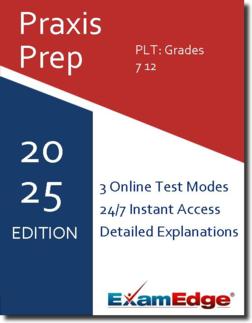Praxis PLT: Grades 7-12 (5624) Practice Tests & Test Prep by Exam Edge - Topics
Based on 20 Reviews
- Real Exam Simulation: Timed questions and matching content build comfort for your Praxis PLT: Grades 7-12 test day.
- Instant, 24/7 Access: Web-based Praxis Principles of Learning and Teaching Grades 7-12 practice exams with no software needed.
- Clear Explanations: Step-by-step answers and explanations for your Praxis exam to strengthen understanding.
- Boosted Confidence: Reduces anxiety and improves test-taking skills to ace your Praxis Principles of Learning and Teaching Grades 7-12 (5624).

Understanding the exact breakdown of the Praxis Principles of Learning and Teaching Grades 7-12 test will help you know what to expect and how to most effectively prepare. The Praxis Principles of Learning and Teaching Grades 7-12 has 70 multiple-choice questions and 4 essay questions. The exam will be broken down into the sections below:
| Praxis Principles of Learning and Teaching Grades 7-12 Exam Blueprint | ||
|---|---|---|
| Domain Name | % | Number of Questions |
| Students as Learners | 22.5% | 16 |
| Instruction and Process | 22.5% | 16 |
| Assessment | 15% | 11 |
| Professional Development, Leadership and Community | 15% | 11 |
| Analysis of Instructional | 25% | 18 |
| Students as Learners | ||
| Instructional Process | ||
| Assessment | ||
| Professional Development, Leadership and Community | ||


